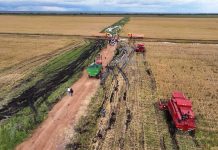Africa-Press – Angola. GITEX Africa 2025 is set to take over Marrakech from April 14-16, bringing together the continent’s brightest minds in tech, business, and investment.
Think AI breakthroughs, fintech movements, and cybersecurity shake-ups, all happening under the Moroccan sun.
One of the many exciting features of this tech festival is Africa’s Digital Summit.
Spanning over the three days of GITEX Africa, you can expect powerhouse speakers, new tech reveals, deep dives into digital economies, and some serious conversations about Digital Public Infrastructure (DPI).
If you’re shaping the digital future (or just want to be in the room where it happens), this is the place to be!Let’s take a look into the main areas that this summit will cover.
The digital economy: A new blueprint for growth
Let’s start with the big picture: Africa’s digital economy.
It’s growing at an incredible pace, and in just a few years, it’s projected to be worth around $180 billion.
But how did it get there? The key lies in innovative frameworks that create a fertile environment for startups, tech giants, and governments to work together.
Countries like Kenya are at the forefront of fintech innovation with platforms like M-Pesa, which allows millions of people to access banking services via mobile phones, while Nigeria’s tech ecosystem is booming, with Lagos becoming a hotbed for tech startups.
This growth isn’t just about numbers; it’s about empowering local communities, creating jobs, and stimulating economies across the continent.
The infrastructure to support this growth — such as increased internet connectivity and the rise of digital payment systems — is just as crucial.
And with Africa’s commitment to creating the world’s largest single market under the African Continental Free Trade Area (AfCFTA), the digital economy is poised for exponential growth.
Digital Public Infrastructure (DPI)
Now, let’s talk infrastructure. For any digital economy to succeed, robust public services are non-negotiable.
With the development of digital public services, Africans across the continent have the ability to pay taxes online, access government services, or receive benefits — all with a click.
Morocco and Kenya are setting the pace with initiatives aimed at building comprehensive national digital identities, allowing citizens to interact more efficiently with government services.
The focus on digital identity systems, data protection, and cybersecurity has never been more critical, especially as Africa becomes a hotspot for cyber threats.
Take the example of Kenya’s Huduma Namba, a national identification system that integrates biometric data for citizens.
Cutting-edge tech like this helps ensure that all people, no matter where they live, have access to the digital services that are changing their daily lives.But it’s not just about technology — it’s about efficient governance.
As the development of data-driven governance continues to flourish in Kenya and across the continent, governments are learning to make smarter decisions based on real-time data.
This is key for public policy development as it helps ensure that decisions are informed by solid evidence rather than guesswork.
Digital transformation & smart cities
As we slowly move into the era of smart cities, let’s think about how urban living is changing.
Across Africa, urban AI deployment is taking off. Cities like Kigali are adopting smart city technologies to enhance everything from public safety to traffic management.
This is bigger than creating real-life futuristic cities like we see in sci-fi movies — there is a real strategy behind it.
Cities are embracing AI to solve some of their biggest challenges, like congestion, waste management, and energy consumption.
The rise of digital transformation strategies is underpinning a new wave of innovation, where urban spaces are becoming more efficient, sustainable, and connected.
Rwanda is one country leading the charge by making the smart city concept a tangible reality.
The government’s vision for Kigali is a city where technology drives everything from transport to energy management.
Kenya is also taking the lead. Nairobi is driving digital transformation by implementing Internet of Things (IoT) solutions to monitor and optimize public services like waste collection and water supply.
These aren’t just pilot projects; they are part of a larger push to use digital tools to solve real-world urban challenges.
The big picture
GITEX AFRICA is more than just a showcase of the latest tech. It will be a chance to see how far Africa has come — and where it’s headed next. Africa is making strides in creating a connected, tech-driven continent where digital economies thrive, citizens access public services with ease, and cities use AI to become more efficient.
And it’s happening now — no longer a distant dream, but a reality being built one innovation at a time.
For those new to the digital revolution, now is the perfect time to get involved.
For those already on board and ready to continue to propel these new ideas forward, GITEX Africa will be the place for you. The future is bright, and it’s digital.
For More News And Analysis About Angola Follow Africa-Press






